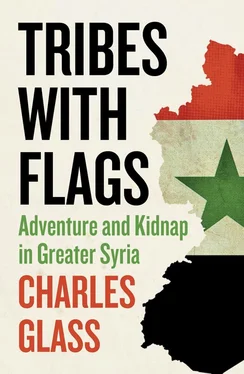“In 1914,” he recounted, “the grandfather of my father was murdered. It was at the time of the troubles. A Muslim mullah took his son, my grandfather, and raised him as his own son, as a Muslim. Our family were all Muslims. My mother was an Arab Muslim, and we spoke Arabic at home. We read the Koran in Arabic.”
“How did you change?”
“One of my family was a candidate in the elections when I was a teenager. His opponents asked people in Merdin, ‘How can you vote for an Assyrian Christian?’ We did not know what they meant. So, we went to Assyrian villagers, who told us, ‘Your family are Assyrian.’ They told us we were related. Then I learned that my great-grandfather had been killed because he was an Assyrian, when many Assyrians died along with the Armenians.”
“Was that reason enough to become a Christian?”
“When I was at the university, studying law,” he said, “I read the Bible and the Koran. Mohammed was a great leader and a clever man, but I did not find him to be a real prophet. I think maybe some Jewish people helped him, because the Koran is very close to the Old and New Testaments.”
“Is your wife a Christian?”
“She is Turkish from Istanbul,” he said. “I explained my situation to her very clearly before we were married, and she accepted it. She is ready to be baptised, but I want her to study first.”
“Is religion important here?”
“Many educated people here are not Christian, but they are not really Muslim. They don’t go to the mosque and don’t like Islamic life. It is something that exists only on the identity card, Muslim, Christian or Jewish.”
“Identity cards still state your religion? I thought this was a secular state.”
“The Turkish Republic was founded in 1923,” he said. “This is not a long time for a state, especially for a people changing their system from Islamic to secular. But we have come a very long way.”
How far had this corner of Turkey come, separated as it was from the world to which it had belonged for millennia? In 1918, when the Turkish army retreated from Syria north into Anatolia, it abandoned the province of Alexandretta, the harbour at Alexandretta town, the city of Antioch on the banks of the Orontes and the fertile fields, mountains and forests in between, its Arab population and its Armenian and Turkish minorities. For the next twenty years, it was divided from the rest of Turkey, ruled by the French as part of their League of Nations Mandate over Syria. In 1938, France held a referendum on the province’s status and created the so-called Republic of Hatay. A year later, the French gave it back to Turkey. Since then, it has been cut off from the rest of Syria. It seemed doomed in this century, as a frontier province of states to either its north or south, to be separated from at least half its historic self.
In the centre of Alexandretta’s seafront, near the port, lay a large marble plaza. On it a giant black monument, shaped like a wave about to sweep away the town and all its people, appeared to rise out of the Bay of Alexandretta. On its high summit stood two life-size sculpted figures: a woman holding an olive branch and a soldier standing to attention. Between them a large Turkish flag, secular red with the white crescent and star of Islam, fluttered in the breeze. Behind them the wave was about to crest, and below them, on a level fashioned into a smaller wave, stood four larger figures marching in a V-formation behind a man in the centre. On the left were two women, one a peasant and the other a sturdy housewife; on the right were two men, a worker and an engineer. The man and woman near the apex of the V together raised a laurel over the head of the man at the front. He stood on the lowest platform, but was larger than them all. A cape was draped cavalierly over his left shoulder, and his strong right arm was outstretched, pointing landward, as though he were emerging from the surf to redeem Alexandretta.
The heroic figure was Atatürk himself at the scene of his final triumph. His confident gaze was fixed on the last province he reclaimed from the Allies, the final piece of Turkey reassembled from the débâcle of the First World War, which saw the loss of an empire and the birth of a modern state. Like Moses, Atatürk had led his people through the water to the Promised Land, without reaching it himself. Less than a year before the French “Armée du Levant” withdrew on his terms, the “Father of the Turks” had died.
Near the Atatürk monument was a small outdoor café. I stopped there to drink a coffee. A waiter said something to me in Turkish, and I asked whether he spoke Arabic. He did. When he brought me a demi-tasse of Turkish coffee without sugar, he sat down and told me how difficult his life was. He said he worked long hours for little money. He had six children. “If I do not work,” he complained, “there is no bread.” Then he shrugged. “I’m an Arab,” he said, as if this were sufficient to explain his impoverished condition. To him and his compatriots, the Atatürk monument symbolised their defeat, the loss of their place in the Arab world and the severing of ties to their brothers in Syria. It mattered little that they, and not their “liberated” and divided Syrian cousins to the south, were living as all Syrians had lived for four centuries – under Turkish rule.
The beachless seafront was built over a large landfill, a few hundred yards of Turkey taken from the sea. On the wide pavement, it was the time of the afternoon promenade. Men pedalled past on bicycles with their wives on the back. Some had children perched in front. One man swept slowly along with one child on his handlebars and, on the back, a woman holding another child. All along the comiche, families were strolling, stopping to buy peanuts or hot, fresh popcorn from the many street vendors. The young boys’ heads were shaved to stubble. Women walked by in groups, none veiled, though many from the countryside wore brightly coloured scarves.
Turkish sailors, their European navy-style caps emblazoned TCB, joined the march, stealing furtive glances at the girls. Everywhere the sailors meandered, well-armed Military Police followed like vigilant dueñas. The MPs, smartly dressed from their white helmets down to the white spats over their black shoes, wore short truncheons on their hips and carried Belgian FN light automatic rifles. I saw no signs of trouble, and I suspected that, while the MPs were on duty, I wasn’t likely to. A few of the sailors were accompanied by their mothers and fathers, who had come to port to visit them.
I joined the parade of humanity on the seafront – Arab and Turkish townspeople, Alawis from the villages, Kurds from the mountains, Christians and Muslims. Mingling among the crowd, hardly noticeable until they approached you, were young boys and old men trying to make money on the pavements. They stood, dressed in old or badly fitting clothes, pleading with passers-by to give them money. Some merely begged, hands outstretched, with nothing to offer in return other than a blessing. Others shined shoes. Some sat in front of old scales, next to bits of cardboard with a few coins on top, and asked people to weigh themselves in exchange for a small donation. Most of the crowd ignored them, content to enjoy the evening promenade. Everywhere, in cafés and outdoors, in small groups and large, men sat at small tables and played cards or backgammon, all the while drinking tea or coffee, oblivious to the procession passing them by.
The sun was slow to set. The sea, where it met the breakwater, was quiet and unmoving. Nothing had disturbed Alexandretta for fifty years, an unpredicted moment of dull tranquillity in a bloody history of more than two millennia. The Bay of Alexandretta lay at the undefined point where the Aegean gave way to the Mediterranean. It was the northern frontier of the Levant – the 440 miles of coast between here and Al Arish in Gaza. Every port on this eastern Mediterranean shore, and every inland city each port served, had been invaded, besieged and destroyed dozens of times before and after Alexander the Great briefly united them in his empire. How long would this historic moment last? And when would the rest of the Levantine coast to the south, troubled by war and insurrection, enjoy again a generation of evenings like this one in Alexandretta?
Читать дальше












